In the 1990s Debi Mazar’s cat-eyed glamour was spotted everywhere, alongside close friend Madonna. Arm-in-arm they strolled red carpets across two continents and partied with a glittery group of social provocateurs.
As an actress, Mazar came on the scene and shone brightly in the 1990 iconic mob film, Goodfellas, as Ray Liotta’s coke-addled mistress. She then appeared alongside actress Annabella Sciorra in Spike Lee’s 1991 interracial romance drama, Jungle Fever and followed that up with two more Spike Lee films, Malcolm X and Girl 6. In 1995 she spiced up the screen as one half of Sugar & Spice alongside Drew Barrymore in Batman Forever. More recent projects included the role of sharp-tongued publicist Shauna on HBO’s runaway hit series, Entourage, which aired from 2004-2011.
Her characters have always been quick to offer a sarcastic comeback or some bold advice, no effs given. If film and television casts can be compared to ingredients, then Mazar is surely the hot sauce.
These days, the mom of two teenage daughters splits her time between New York City and Italy. Landing on another hit series with TV Land’s Younger, now going into its seventh season, Mazar takes the reigns once again as irreverent artsy urbanite, Maggie. The show centers around a Gen-X divorcee who poses as a millennial to jumpstart her career in book publishing, only to have worlds collide in parenthood, work and love.
When speaking with Mazar, she gives it to me straight, no chaser. A dye in the wool New Yorker with an Avant-Garde spirit, she shares her views on friendship, parenthood, social media and the art of risk taking.
That’s My Entertainment: In your series, Younger, your character Maggie is the catalyst that gives the other characters permission to make bold decisions that they wouldn’t ordinarily make. In your own life, who has given you permission to draw outside the lines?
Debi Mazar: I surround myself with many friends that do that for me; it’s not just one person. Certainly, it starts with my husband. I obviously run things by him. In my life, I’ve had people I looked up to who were older, or who had sage advice in their soul to offer. Sometimes it could even be my teenage daughters. Their thoughts are generally so pure. My older gay male friends always have sage advice, and my girlfriends, [the late fashion designer] Isabel Toledo being one of them, and Madonna being one of them… ultimately, you know deep in your soul what you should do, and I’ve always been a risk-taker.
TME: Are you as bold and irreverent as the characters you’ve played?
DM: I think I’m bolder than my current character on Younger, for real! Maggie is a little more Bohemian, and she’s [artsy]. I sometimes wish she could be even bolder. I know she’s a catalyst for the story. Often, in my life, I’m just like, “Oh please, just fucking do it already!” I think I’m a little bit more the type of person in my own life who will say, “Do what you need to do,” as opposed to merely suggesting. There have been times with the character of Liza (played by Sutton Foster), where I wish my character, Maggie, could have offered her that type of direct advice. But we have to tell a story and stretch it out for television.

“Younger” Ep. 404 (Aired 7/19)
TME: Younger just finished its sixth season, and you’re going into your seventh season. It’s amazing when you consider how much competition there is for people’s attention these days. Why do you think the show has resonated with your audience?
DM: Our show is about female relationships, for the most part. They’re strong women who are bonding together and lifting each other up. In a world that is so crazy, I think that is a big part of the show’s appeal. Our show is also filled with humor, it’s extremely positive and light. It really is entertainment.
The marketing machine that TV Land and Viacom put together, in terms of promoting the show and how they continue to promote the show, has been aggressive and fun. I give them a lot of credit for throwing it out into the stratosphere, especially on a network that was all about reruns. When I first got offered the show and they said it was on TV Land, I said, “Wait, isn’t that the rerun channel?”
TME: That reminds me of what Dave Chappelle said about the first season of Chappelle’s Show airing on Comedy Central. He said, “That wasn’t exactly the place to be at the time.” Sometimes it takes one groundbreaking show.
DM: Yeah, I was like, “Oh, that’s weird. I don’t know.” (laughs) Of course, I would love being next to I Love Lucy, but they were doing this whole new launch of original programming when Younger started. Having the platform of Hulu, and wherever else you can watch Younger, that’s helped enormously to blast it out, and the show has sold well, globally. I hop through airports constantly, and no matter where I go people tell me they watch Younger. Ultimately, our show is about love.

“Younger” Ep. 604 (Airs 7/10/19)
Allison Kugel: I would consider you a Gen-Xer, like me. There is a Gen-X versus Millennial component to the show that speaks to a lot of people. Do you long for what was, or are you more of an embrace the times we’re in kind of person?
Debi Mazar: I’m a mother of teenagers, so I’ve had to deal with Millennials and Gen-Z, and I find them so refreshing. I am a Gen X type of person in terms of where I live, and liking how things used to be, and yes, I do complain that I liked New York City better when it was less crowded. I liked the city when it was edgier and not so antiseptic and cleaned up. On the flip side, I’m also a modernist and someone that looks to the future. I can’t sit around talking about how things used to be, because you have to exist in how things are and make your next decisions based on that. I can easily decide that I’m moving to Italy tomorrow, because I married an Italian and we have a country home in Florence. And I can choose to really go a whole other route, pretend like I’m in the Renaissance, and live in the country and tune out a lot of stuff. But I’m kind of addicted to certain things at this point. I have Instagram and I sit and check my phone for things all the time.
TME: Darren Star is the brilliant creator of Younger. What would you say are the hallmarks of a Darren Star (Beverly Hills, 90210; Sex and the City; Younger) television series?
DM: Darren likes to push buttons in terms of sexuality. He likes to push buttons with love triangles, the dynamics of friendships and with fashion. He loves all of that. If you watch any of his shows, there is always an element of people that are living on the edge, having to make decisions; they are dressing up and going out; they are having fun; and they’re voracious and hungry for things. His shows are funny, witty, fast-moving and nice to look at. The greatest thing Darren does is write wonderful female characters. I mean, remember when Sex and the City was happening? A lot of people were like, “I’m the Samantha of my group,” or “I’m the Carrie.” With my character, Maggie, on Younger, I’m happy to play a lesbian. I think it appeals to a huge demographic within the LGBTQ (at this point Mazar laments that she may be leaving out some letters) community. It’s relevant.
TME: Darren Star recently claimed there is a statistic showing that women are often put in positions of power during extreme corporate shake ups, placing them on what he referred to as “the edge of a cliff,” and making them more vulnerable to failure in their respective positions. In Younger, Hilary Duff’s character, Kelsey, experiences this when she is put in charge of Millennial Publishing during a shake up in the company. Do you think the audience is ultimately looking to be entertained by her failure, or inspired by her success?
DM: I think the audience is watching to see what happens. We all live on the edge of not knowing whether we’re going to be a failure or a success, and failure and success is something that is measured by ego. It could be measured in many different ways. I don’t know if that is a proven statistic, but I happen to think that women are stronger than men in many ways. Women turn shit around all the time. There are a lot of success stories in Corporate America of how women have turned things around. So, I don’t really know where that statistic comes from and I don’t think it’s a male or female thing, necessarily. Half of it is luck and timing, anyway.

“Younger” Ep. 608 (Airs 8/07/19)
TME: Do you think someone can become extremely successful playing by the rules, or do you think that rules must be broken while chasing a dream?
DM: A rebel has to break rules. You have to take chances, and you have to fall on your face before you get back up and know that you made a mistake, and you can try to do it differently. I think you have to break the rules to a degree… in a smart way.
TME: Who in your life has made you most proud to have been born a woman?
DM: It’s interesting, because I wanted to have a son, but I got daughters. I’m proud that they ended up being girls, because they’re magnificent. I look at Malala [Yousafzai] paving the way. She was tortured; being a woman representing a society and getting shot in the head, and then going out there and being an activist. There’s the Gloria Steinems of the world, and a billion other women of the world. Had they been born men… I just think that gender isn’t necessarily the answer. The gender discussion now is so big that sometimes people aren’t born women and they choose to become them. And, hey, that’s a beautiful thing too.
TME: Why do you think ageism is so prevalent in American culture, specifically?
DM: Oh God! Well I think it’s not just America, unfortunately.
TME: Since you live in Italy for part of the year, would you say it is similar or different in that respect?
DM: I feel young for my age, to a degree, but my body doesn’t always feel so young because I’m not, and it’s just how it is. Throughout history, men were always the presidents in America. We still haven’t had an American president that’s a female. When I’m in Europe, people appreciate people, whether they have leathery skin or not. It’s about character and their souls and their mind.
I do feel appreciated in America, because I think it’s about the frame of mind of the person who might feel the ageism. I might not be able to go out and get a job that a twenty-year old is getting, but I don’t try to do that. In fact, when I was in my late twenties and early thirties, I was chasing after the roles of grandmothers on sitcoms. I don’t care about the number. As an actor, we all have to be different shapes, sizes, colors and have imperfections. That’s what makes us look interesting.

“Younger” Ep. 408 (Aired 8/16)
TME: What are your thoughts on Younger’s lead character Liza (played by Sutton Foster) relaunching her career in publishing by lying about her age? The series starts off with her pretending to be 26, although she is a forty-year-old divorcee with a teenage daughter.
DM: When the series starts off, her character was damaged. She was a divorcee suffering from a broken heart, a broken family, living in the suburbs, truly devoting herself to her child, which we all do. Suddenly she is single and going, “Oh my God, my daughter is moving out and going to college. What the hell am I going to do?” When she comes to my apartment, I am there to save her and wrap her up in my arms and be a friend first. I tell her, “I love you, you’re great, you’re beautiful.” When all of these [job] interviews are not working out, I suggest she have some fun and change it up. When I first started my career, I didn’t have a lot of acting credits and I fudged a little bit on my resume to make it look better than it was, because I wanted to get some action. I don’t think there’s anything wrong with hustling, embellishing and trying to convince people that you can do the job.
TME: Speaking of this generation leading the way, what’s one piece of technology that you can’t live without, personally and professionally?
DM: Instagram, hands down! I’m able to post a still-life image that I find beautiful, or I’m able to show something that I shoot a picture of, that’s funny and makes people laugh. I’m able to share a photograph of a throwback from a moment in my life. It’s a reflection of my sense of style, my sense of photography, my sense of depth of field, color and comedy. To me, Instagram is really that and I keep my feed positive. On the flip side of it, when people come after me for my anti-Trump stuff or political stuff, I just block certain people. I don’t want to read into it and fall down that rabbit hole. I love WhatsApp because you can talk to anybody all over the world, and I also love how in Europe everyone walks down the street voice messaging into their phone’s mic, instead of texting. That’s my new favorite thing to do.
TME: Towards the end of season six of Younger, your character Maggie is having a steamy fling with actress Nicole Ari Parker, who guest stars on the show. What was that like?
DM: You know, Nicole Ari Parker did the two episodes of our show and we never closed out the fact that we’re having this little affair. Then I date a guy after her. It shows that Maggie’s hot to trot, and she’s on the market

“Younger” Ep. 607 (Airs 7/31/19)
TME: Your character is very fluid, sexually?
DM: Actually, she’s not fluid, but she is just seduced by a single moment with a man in that one episode. So, she’s not fluid. But if Darren [Star] decides I’m fluid in season seven, then I guess I will be (laughs).
TME: (Laughs)
DM: But he decided, at least in season six, that I wasn’t, and I’m fine with that. If I have to, I’d much rather make out with girls than make out with guys, because I’m married, and I only want to kiss my husband.
TME: I get that.
DM: I mean, if I have to it’s okay, it’s part of my job, but it’s much easier for me to go on set and be like, “Look, we got this. Let’s make this fun.” Sometimes you get these actresses who get a little bit nervous. I just make them feel calm and loved and feel easy about doing the scene with me.
Nicole [Ari Parker] and I had moments where we’d be on the street ready to make out for a scene, and I taught her how to kiss me for the cameras. We didn’t have to put tongues down, we just put our lips together and smash our faces together like they did in the 1920’s movies. It doesn’t have to be this groping, weird thing. Actors can make it look good if they know what they’re doing. It’s really about the suggestion of sensuality.

“Younger” Ep. 510 (Airs 8/14/18)
TME: You’ve had a group of eclectic and fabulous friends over the years. What kinds of people do you typically gravitate towards in your own life?
DM: I’m that person that supports all people. I love fucked up people; I love straight shooters; I love people that are very by the book. I just see beauty in all kinds of people. When you let go of the norms and you allow people to be who they are, you find beauty and strength in them.

Younger Season 6 Key Art
Younger airs on TV Land on Wednesdays at 10/9c. Catch up on Seasons 1-6 on TV Land On Demand or on Hulu and PlayStation Vue. Follow Debi Mazar on Instagram @debimazar.

TV
Did JD from Scrubs Have a Dark Past?

TW: Discussions of child abuse and neglect.
The sitcom Scrubs ran from 2001- 2010 delighting viewers with the escapades of daydreaming Dr ‘JD’ Dorian and his friends. Unlike most TV sitcoms Scrubs perfectly balanced the comedic and the tragic. Being set in a teaching hospital with most of the main cast being doctors; there was plenty of fodder for some truly heart-wrenching storylines.
Like with most sitcoms, if you look under the jolly veneer (and have too much time on your hands) a much darker story emerges. In Scrubs, I would argue, this may be the past of its titular protagonist JD (played by Zach Braff). Some fans (ok, me) speculate that not only did JD have a less than ideal childhood but an abusive one.
Hints of this could be interpretated throughout the series:-
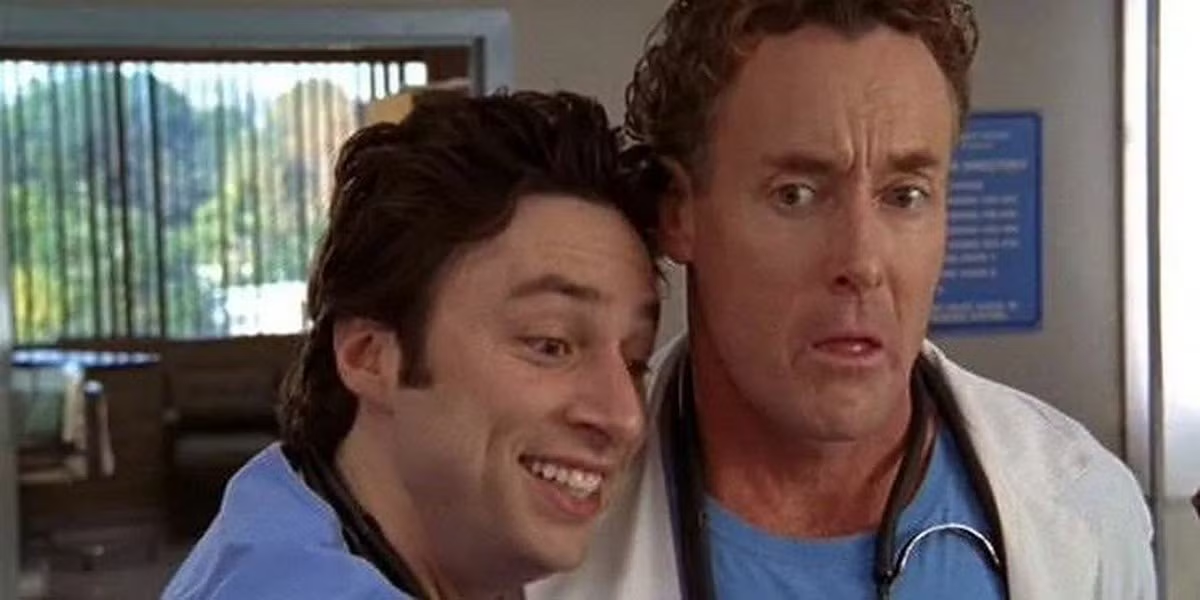
1. Attachment to Dr Cox
One of the most popular aspects of the series is the oddly touching relationship between mentor and mentee: Dr Cox (John C McGinley) and JD. It’s perfectly normal to admire and want to emulate an older colleague. But JD’s admiration of Dr Cox always seemed to go a step further. JD looked to the older doc as not only a mentor but a father figure.
JD explicitly states this throughout the series. Most notably in the finale; when during his much sought after hug JD claims Dr Cox smells “like a father figure”. This is odd as Dr Cox is only about 13 years JD’s senior. We know JD’s biological father (played by the late John Ritter) was pretty much absent during JD’s childhood. Is this yearning for a parental figure a way to fix JD’s damaged childhood?
As loathe as I am to criticise a fan favourite but Dr Cox openly mocks and belittles JD, almost never referring to his protégé by name. Instead by a vast archive of disparaging nicknames. The show does establish that there is love and respect om both sides, from Dr Cox deep down (deep, deep down). But why does JD not only put up with as well as seek out this treatment? Very masochistic. Or, has JD been subconsciously taught that taunts and aggression equate to love?

2. Feels Affinity with Dr Cox and Elliot
The show establishes early on that Dr Cox had an abusive homelife as a child. He openly reminisces about his parents being violent alcoholics. Is this the real reason that JD clamours for Dr Cox’s attention? Does JD see Dr Cox as an inspiration of someone who came from a similar background to his and became a well-respected doctor and family man?
Is the same true of JD’s on/off girlfriend, future wife and fellow doctor; Elliot? The show establishes that Elliot’s parents are mentally, emotionally, and financially abusive. Are JD and Elliot drawn to one another (partly) because they are both traumatised by their past? Even when it is proven time and time again that they are not suited.

3. Hostile Relationship with Older Brother
JD’s older brother Dan (Tom Cavanagh) appears several times in the show. Despite regularly visiting his kid brother, JD makes clear that these visits are not welcomed. JD’s ire is uncharacteristic as he’s shown as an ardent people pleaser throughout the show. Yes, Dan did bully JD throughout their childhood, though it’s unclear whether this was normal sibling rivalry or more.
In Series 3 Episode 5 ‘My Brother, Where Art Thou?’ JD attempts to cut off contact with Dan claiming that Dan never looked out for him. Even as children of divorce why is JD so upset his brother didn’t protect or “come through” for him? In the same scene JD comments about how their mother “married anyone that rang the doorbell”. Reading into this (hey, it’s what we’re here for) did Dan not protect JD from these multiple husbands?

4. Audience Never Actually See JD’s Mother
To me this is the most obvious that something is suspicious about the Dorian matriarch. Despite seeing every other cast members mother (except Dr Cox but its implied that his parents are dead) we never see JD’s. He, at the very least, seems to have a good relationship with his mother. Mostly speaks highly of her and she calls often. It doesn’t follow the trope many sitcoms use; having a character the audience never physically sees being used for comedic effect.
We hear JD’s mum (Barbara) speak in a flashback (Series 3 Episode 21 ‘My Self-Examination’). While Barbara was tucking young JD into bed she was saying some quite toxic things to her child, like how no women will ever be good enough for him. It is clear this scene is supposed to be somewhat creepy as Barbara is stroking the child’s face in an inappropriate manner. Adult JD even refers to his mum as “sexy” in the same episode. Very Freudian but in the light of everything else we are discussing: very disturbing!
5. JD’s Mother Drank
Linked to number 4 JD admits in Series 8 Episode 2 ‘My Last Words’ JD admits his mum “drank a lot”. Does this statement answer some questions about JD’s odd childhood?
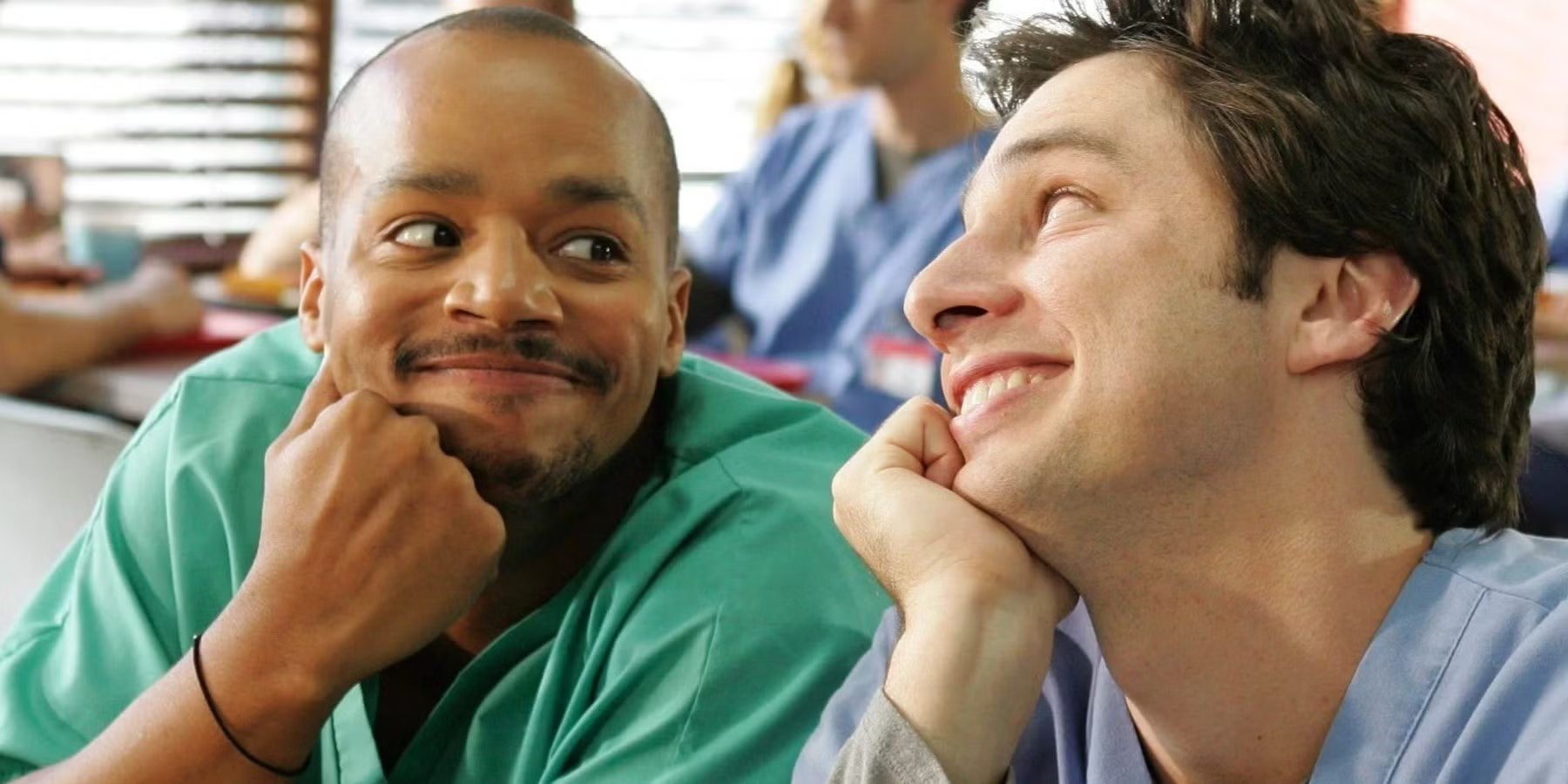
6. JD is a People Pleaser
As we have already mentioned JD is a pathological people pleaser (what’s that like?). As a doctor he goes above and beyond for his patients. He does everything from finding patients estranged family members (Series 4 Episode 11 ‘My Unicorn’) to shaving his head in solidarity with a chemo patient (Series 5 Episode 15 ‘My Extra Mile’). Of course this is all very commendable but JD particularly enjoys the gratitude. Why does he need this validation? Is this a coping mechanism from a turbulent background who had to go above and beyond to get the love that should have been unconditional?
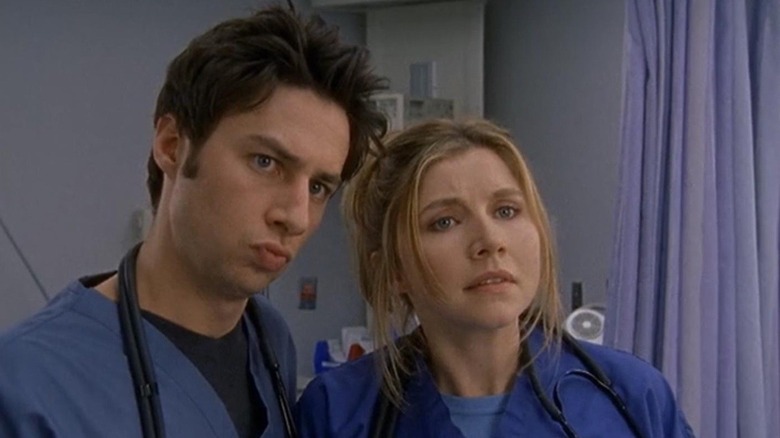
7. Extremely Tactile
Another of JD’s character traits is he extremely tactile. This is of course played up for comedy with his ‘sneak hugs’ (Series 6 Episode 13 ‘My Scrubs’) delivered to the stand-offish Dr Cox or the fact he has his friends on a ‘hugging schedule’ (Series 5 Episode 8 ‘My Big Bird’). Is this someone trying to seek the love and affection he never received in childhood? Or reassure himself that the people he loves won’t disappear?
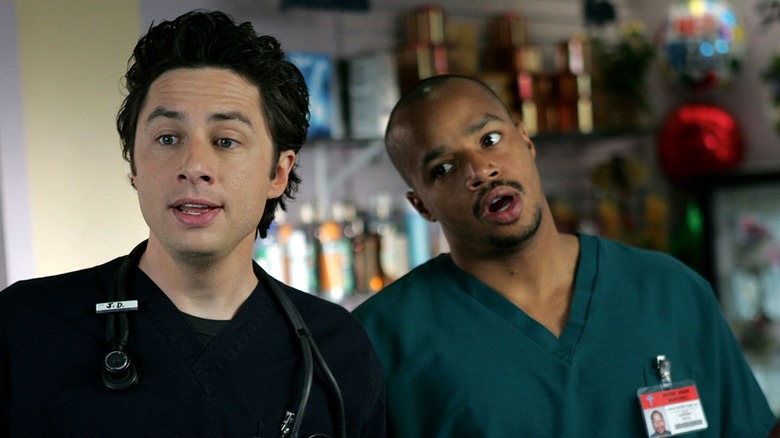
8. Self-Sabotaging
A common reaction to childhood trauma is self-sabotaging behaviour. In his romantic relationships JD has this in spades. Throughout the run of the show JD has more romantic partners than the rest of cast put together. It is acknowledged that JD goes from relationship to relationship with alarming speed and breaks them off for shallow reasons. Again, he may be trying to seek the love and security he never had in childhood.
JD’s damaged psyche is put on full display when after spending the majority of the series chasing Elliot she finally leaves her loving boyfriend for him. JD immediately decides he doesn’t want her anymore to many fans outrage (Series 3 Episode 20 ‘My Fault’).
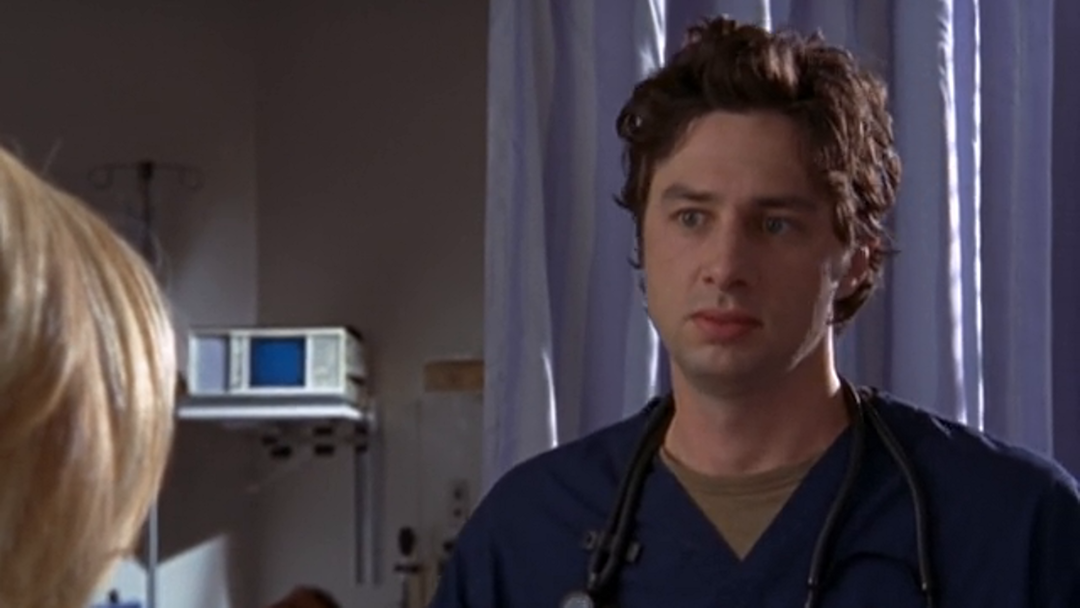
9. No Therapy
As well as never actually seeing his mother, we never see JD engaged in any kind of therapy. All of the other characters attend various types of therapy throughout the series. JD does not, despite arguably needing it the most. Is JD perhaps too scared of what therapy might uncover or not want to deal with his trauma head on?
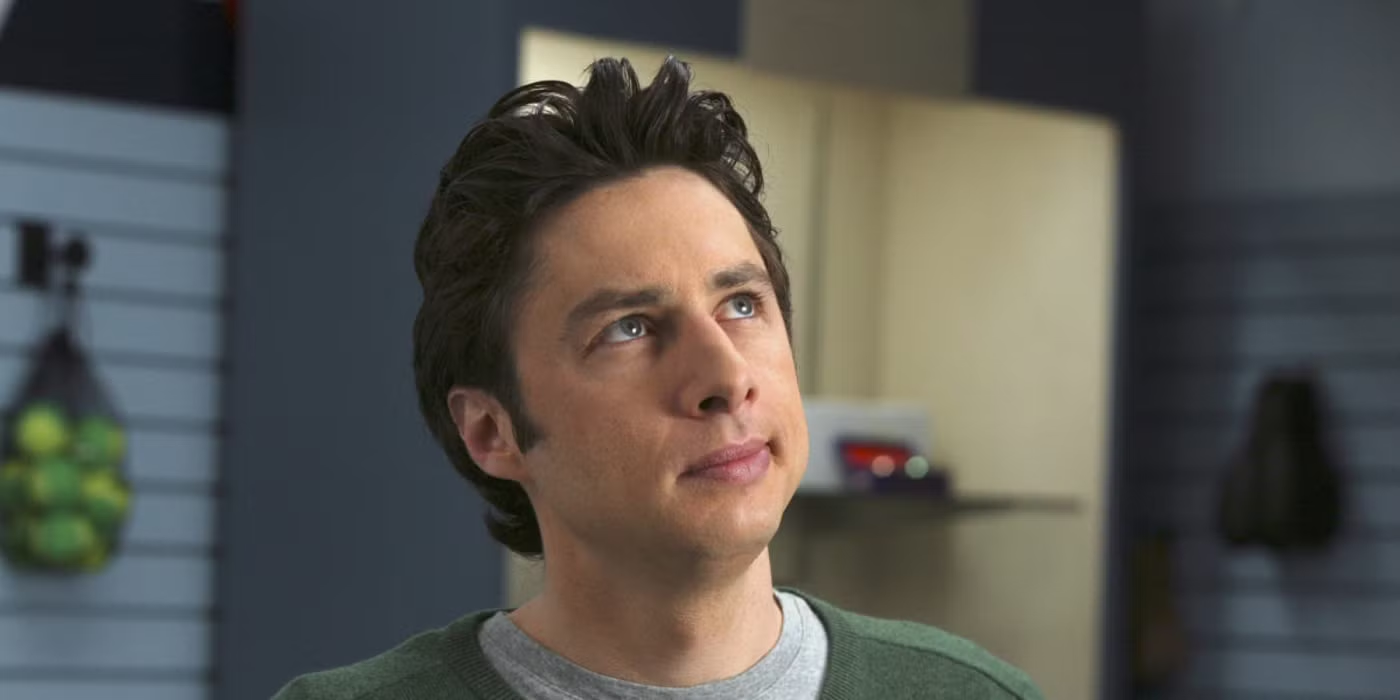
10. Overactive Imagination
During Scrubs entire run (except the final series thou shalt not be named) hinges on JD’s overactive imagination. His outlandish fantasies make for excellent comedy and unique sequiturs to break up the storylines. But what if this was yet another coping mechanism for the hapless leading man?
Children from challenging background often disappear into elaborate fantasy worlds in order to escape their surroundings. Is this a habit JD could never quite kick? It would explain why he doesn’t seem to have a lot of control of his daydreaming despite being an adult. It is a comfort and a way to deal with the difficult stuff life throws at him.
If any or all of these speculations are true Scrubs goes from being a mere half-hour sitcom to a story of one man’s triumph over his dark past. Despite his flaws and failings JD has still made something of himself and is surrounded by his chosen family; all of whom love him for who he is. This is extremely inspiring.
Movie
‘Mufasa: The Lion King’ Will Leave You Breathless

“Mufasa: The Lion King” is a visually stunning addition to the beloved Lion King franchise, offering a fresh and emotionally resonant take on the origins of one of Disney’s most iconic characters. The film beautifully explores Mufasa’s journey, balancing heartfelt moments with touches of comedy that lighten the mood and make the story accessible to audiences of all ages. The animation is breathtaking, capturing the vibrant landscapes and lush environments of the Pride Lands, adding depth to Mufasa’s character and his relationships.
The storytelling is compelling, effectively pulling at the heartstrings while providing insights into Mufasa’s character before he becomes the legendary king. However, the setup for Scar’s betrayal feels somewhat underdeveloped, lacking the deeper motivation that could have enriched their complex brotherly relationship. This missed opportunity leaves a slight gap in understanding Scar’s actions, which could have elevated the dramatic stakes.
The musical score is impressive, featuring memorable songs that enhance the emotional impact of pivotal scenes. While there are several standout tracks, one song, in particular, resonates deeply and is sure to linger in viewers’ minds long after the credits roll. Overall, “Mufasa: The Lion King” is an amazing film and a worthy addition to the Lion King lore that manages to deliver both laughter and tears, offering a rich tapestry of storytelling that fans will appreciate.
Movie
Is ‘Kraven the Hunter’ a Total Letdown?

“Kraven the Hunter,” directed by J.C. Chandor, aims to introduce a beloved Spider-Man villain to the big screen, but unfortunately, it falls short of expectations. The film suffers from noticeable issues, notably an overuse of ADR (Automated Dialogue Replacement), which detracts from the authenticity of the characters’ interactions and contributes to an uneven audio experience. This technical flaw is compounded by rough storytelling that feels disjointed and lacking in coherence, leaving viewers struggling to connect with the narrative.
Aaron Taylor-Johnson delivers a commendable performance as Kraven, showcasing the character’s gritty nature and complex motivations. His portrayal has potential, and it’s evident that he could elevate the character far beyond what is presented with a stronger script and direction. However, the absence of Spider-Man, a central figure in Kraven’s lore, leaves a void that the film struggles to fill. Without this critical connection, the plot meanders and fails to create the tension or stakes that fans of the superhero genre crave.
Additionally, including Rhino as a villain feels like a missed opportunity; he is presented more as a gag character with limited screen time, undermining any sense of threat or depth. For the average moviegoer, “Kraven the Hunter” might entertain but ultimately feels like a mediocre viewing experience. Comic book fans, however, may find disappointment in this lackluster attempt to create a solo character film. Instead of an exhilarating dive into Kraven’s world, the film presents a watered-down version, leaving audiences wishing for a more cohesive vision that honors its comic book roots.


